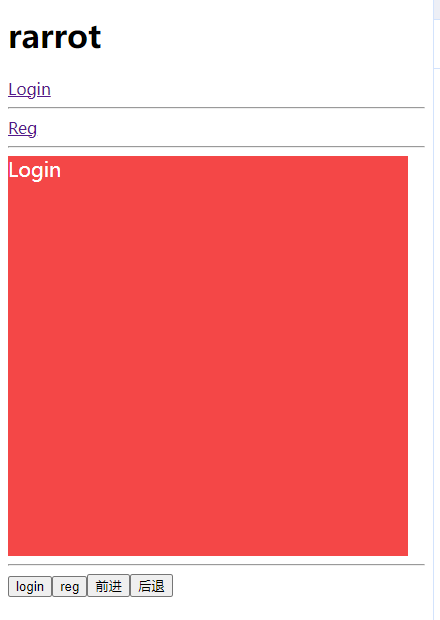vue-router的使用
根据小满zs的这个视频编写的笔记
安装
bash
npm install vue-router@4
//或者
yarn add vue-router@4
# 或者使用 pnpm
pnpm install vue-router@next使用
安装后在main.ts去注册一下:
typescript
import { createApp } from 'vue'
import './style.css'
import App from './App.vue'
import router from './router/index'
let app = createApp(App)
app.use(router)
app.mount('#app')./router/index.ts
typescript
import { createRouter,createWebHistory,RouteRecordRaw } from 'vue-router'
const routes:Array<RouteRecordRaw>=[
{
path:'/',
component:()=>import('../components/login.vue')
},
{
path:'/reg',
component:()=>import('../components/reg.vue')
}
]
const router=createRouter({
history:createWebHistory(),
routes
})
export default router路由模式
vue2 mode hash vue3 createWebHashHistory
hash是URL中hash(#)及后面的那部分,常用作锚点在页面内进行导航,改变URL中的hash部分不会引起页面刷新。
通过hashchange事件监听URL的变化,改变URL的方式只有这几种:
- 通过浏览器前进后退改变 URL
- 通过<a>标签改变 URL
- 通过
window.location改变URL
可以通过window.addEventListener('hashchange',(e)=>{console.log(e)})来监听路由的变化
vue2 mode history vue3 createWebHistory
history 提供了 pushState 和 replaceState 两个方法,这两个方法改变 URL 的 path 部分不会引起页面刷新。
history 提供类似 hashchange 事件的 popstate 事件,但 popstate 事件有些不同:
- 通过浏览器前进后退改变 URL 时会触发 popstate 事件
- 通过
pushState/replacestate或 <a>标签改变 URL 不会触发 popstate 事件 - 可以拦截 pushState/replaceState的调用和<a>标签的点击事件来检测 URL 变化
- 通过js 调用history的back,go,forward方法课触发该事件
可以通过window.addEventListener('popstate',(e)=>{console.log(e)})来监听路由的变化
vue2 mode abstact vue3 createMemoryHistory
命名路由
就是给路由添加上name属性,使其可以通过获取name进行跳转
./router/index.ts
typescript
import { createRouter,createWebHashHistory,RouteRecordRaw } from 'vue-router'
const routes:Array<RouteRecordRaw>=[
{
path:'/',
name:'Login',
component:()=>import('../components/login.vue')
},
{
path:'/reg',
name:'Reg',
component:()=>import('../components/reg.vue')
}
]
const router=createRouter({
history:createWebHashHistory(),
routes
})
export default router./App.vue
vue
<template>
<div>
<h1>rarrot</h1>
</div>
<!-- 添加replace可以不保留跳转的历史记录 -->
<router-link :to="{name:'Login'}">Login</router-link>
<hr>
<router-link :to="{name:'Reg'}">Reg</router-link>
<hr>
<!-- 接收视图转变 -->
<router-view></router-view>
<hr>
<button @click="toPage('Login')">login</button>
<button @click="toPage('Reg')">reg</button>
<button @click="next()">前进</button>
<button @click="prev()">后退</button>
</template>
<script setup lang='ts'>
// import { ref,reactive } from 'vue'
import { useRouter } from 'vue-router'
const router = useRouter()
const toPage = (url:string) => {
// 字符串
// push改为replace可以不保留跳转的历史记录
// router.push(url)
// 对象
// router.push({
// path:url
// })
// 命名式
router.push({
name:url
})
}
const next=()=>{
router.go(1)
}
const prev=()=>{
router.go(-1)
}
</script>
<style scoped>
</style>
路由传参
在login页面进行传参
vue
<template>
<div>嘿嘿嘿! 我是列表页面</div>
<table cellspacing="0" class="table" border="1">
<thead>
<tr>
<th>品牌</th>
<th>价格</th>
<th>操作</th>
</tr>
</thead>
<tbody>
<tr :key="item.id" v-for="item in data">
<th>{{ item.name }}</th>
<th>{{ item.price }}</th>
<th>
<button @click="toDetail(item)">详情</button>
</th>
</tr>
</tbody>
</table>
</template>
<script setup lang='ts'>
import { data } from './list.json'
import { useRouter } from 'vue-router';
const router=useRouter()
// 下载在JSON to TS插件可以在json数据页面按ctrl+shift+alt+s获取item类型
type item = {
name: string;
price: number;
id: number;
}
const toDetail = (item: item) => {
router.push({
// 使用params进行路由传参必须传入name
name:'Reg',
path:'/reg',
// 路由传参
// query:item
params:item
})
}
</script>
<style scoped>
.login {
background: #f44747;
height: 400px;
width: 400px;
font-size: 20px;
color: white;
}
</style>在reg页面进行接收参数
vue
<template>
<div class="reg">
<div>嘿嘿嘿! 我是列表页面</div>
<!-- 用query传参就将params改为query -->
<div>物种:{{ route.params.name }}</div>
<div>价格{{ route.params.price }}</div>
<div>ID:{{ route.params.id }}</div>
</div>
</template>
<script setup lang='ts'>
import { useRoute } from 'vue-router';
const route=useRoute()
</script>
<style scoped>
.reg{
background:#20d18b;
height: 400px;
width: 400px;
font-size:20px;
color:white;
}
</style>使用params传参会出现重新加载页面丢失参数的问题 官方解决办法github地址
嵌套路由
./router/index.ts
typescript
import { createRouter,createWebHashHistory,RouteRecordRaw } from 'vue-router'
const routes:Array<RouteRecordRaw>=[
{
path:'/fa',
name:'footer',
component:()=>import('../components/footer.vue'),
children:[
{
path:'',
name:'Login',
component:()=>import('../components/login.vue')
},
{
path:'reg',
name:'Reg',
component:()=>import('../components/reg.vue')
}
]
},
]
const router=createRouter({
history:createWebHashHistory(),
routes
})
export default router./components/footer.vue
vue
<template>
<div>
<router-view></router-view>
<hr>
<h1>我是父路由</h1>
<div>
<router-link to="/fa/">Login</router-link>
<router-link to="/fa/reg">Reg</router-link>
</div>
</div>
</template>
<script setup lang='ts'>
// import { ref } from 'vue'
</script>
<style scoped>
</style>